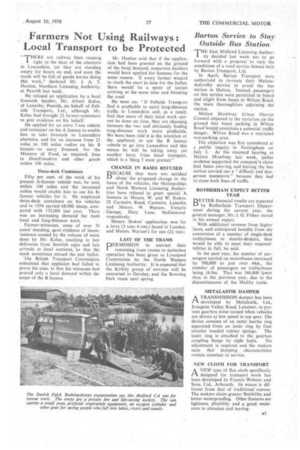Farmers Not Using Railways : Local Transport to be Protected
Page 37

If you've noticed an error in this article please click here to report it so we can fix it.
" THERE are railway lines running
right to the door of the abattoirs in Lancashire, yet they are standing empty for hours on end, and soon the roads will be full of goods lorries doing this work," declared Mr. J. A. T. Hanlon, Northern Licensing .Authority, at Penrith last week.
He refused an application by a local livestock haulier, Mr. Albert Kelso, • of Lazonby, Penrith, on behalf of Fellside Transport, Ltd., although Mr. Kelso had brought 22 farmer-customers to give evidence on his behalf: He applied for an extra 5-ton vehicle and container on his A licence to enable him to take livestock to Lancashire abattoirs, and for an increase from 25 miles to 100 miles radius on his B licence—to carry livestock for the Ministry of Food, as required, lime to Dumfriesshire and other goods within 100 miles.
Three-deck Containers Fifty per cent, of the work of his present A-licence vehicle was, he said, within 100 miles and the increased radius would enable him to use his Blicence vehicles for it. ' He employed three-deck containers on his vehicles and in 1954 carried 68,000 sheep, compared with 132,000 last year. There was an increasing demand for both local and long-distance work.
Farmer-witnesses, some of over 30 years' standing, gave evidence of inconvenience caused by the volume of work done by Mr. Kelso, resulting in late deliveries from Scottish sales and late arrivals at local auctions, so that the stock sometimes missed the sale ballot.
The British Transport Commission submitted that applicant had failed to prove his case, in that his witnesses had proved only a local demand within the scope of the B licence. Mr. Hanlon said that if the application had been granted on the ground of the local demand, numerous hauliers would have applied for licences for the same reason. If every farmer wanted to reach the mart in time for the ballot, there would be a spate of lorries arriving at the same time and blocking the road He went on: "If Fellside Transport find it profitable to carry long-distance traffic to Lancashire and, as a result, find that more of their local work cannot be done on time, they are choosing between the two and obviously finding long-distance work more profitable. We have been told it is the intention of the applicant to use the B licence vehicle to go into Lancashire and this means he will he taking away yet another lorry from local transport, which is a thing I must protect" CHANGEIN BASES REFUSED
nECAUSE they were not satisfied
about the proposed change in the bases of the vehicles, the Metropolitan and North Western Licensing Auth6rities have refused to grant special A licences to Messrs. W. and W. Stokes. 22 Carstairs Road, Carstairs, Lanarks, and Messrs. W. Watson, Victoria Garage, Dury Lane. Hollinwood. respectively.
Messrs. Stokes' application was for a lorry (3 tons 4 cwt.) based in London. and Messrs. Watson's for one (2+ tons; LAST OF THE TRAMS
PERMISSION to convert their remaining tram routes to motorbus operation has been given to Liverpool Corporation by the North Western Licensing Authority. It is expected that the Kirkby group of services will be converted in October, and the Bowring Park route next spring.




































































































